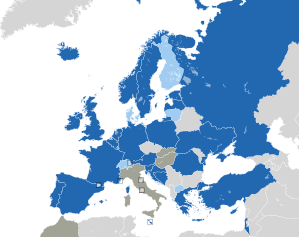
Back مسابقة الأغنية الأوروبية 2003 Arabic 2003 Avroviziya Mahnı Müsabiqəsi Azerbaijani Конкурс песні Еўрабачанне 2003 Byelorussian Евровизия 2003 Bulgarian Festival de la Cançó d'Eurovisió 2003 Catalan Eurovision Song Contest 2003 Czech Eurovision Song Contest 2003 Danish Eurovision Song Contest 2003 German Διαγωνισμός Τραγουδιού Eurovision 2003 Greek Eŭrovido-Kantokonkurso 2003 Esperanto
| Eurovision Song Contest 2003 | |
|---|---|
| Magical Rendez-vous | |
 | |
| Dates | |
| Final | 24 May 2003 |
| Host | |
| Venue | Skonto Hall Riga, Latvia |
| Presenter(s) | |
| Directed by | Sven Stojanović |
| Executive supervisor | Sarah Yuen |
| Executive producer | Brigita Rozenbrika |
| Host broadcaster | Latvian Television (LTV) |
| Website | eurovision |
| Participants | |
| Number of entries | 26 |
| Debuting countries | |
| Returning countries | |
| Non-returning countries | |
| |
| Vote | |
| Voting system | Each country awards 1–8, 10, and 12 points to their ten favourite songs |
| Winning song | |
The Eurovision Song Contest 2003 was the 48th edition of the Eurovision Song Contest. It took place in Riga, Latvia, following the country's victory at the 2002 contest with the song "I Wanna" by Marie N. Organised by the European Broadcasting Union (EBU) and host broadcaster Latvijas Televīzija (LTV), the contest was held at the Skonto Hall on 24 May 2003. The contest was presented by last year's winner Marie N and former contestant Renārs Kaupers.[1]
Twenty-six countries participated in the contest, beating the record of twenty-five first set in 1993. It saw the return of Iceland, Ireland, the Netherlands, Norway and Poland after having been relegated from competing the previous year. Portugal also returned to the contest after being absent the previous year, while Ukraine participated in the contest for the first time.[2] Denmark, Finland, Lithuania, Macedonia and Switzerland were relegated due to their poor results in 2002.
The winner was Turkey with the song "Everyway That I Can", performed by Sertab Erener who wrote it with Demir Demirkan. This was Turkey's first victory in the contest after 28 years of participation. Belgium, Russia, Norway and Sweden rounded out the top five. Further down the table, the United Kingdom achieved their worst result to date, finishing twenty-sixth (last place) with no points. However, they avoided relegation due to being one of the "Big Four" countries at the time.[3] The host country Latvia placed twenty-fourth (third from last) – this was the first time since 1995 that the host entry did not place in the top 10, and it was, overall, the worst result for a host entry since 1992.
This was the last contest to take place on one evening. The EBU revealed that it would be adding a semi-final show to the competition in order to accommodate the growing number of interested countries wishing to take part in the contest.[4] This was also the last contest in which a relegation system was used to determine which countries would participate in the following year's contest. As the Belgian entry was sung in an imaginary language, this was also the first time the contest featured a song with no parts performed in English or a language native to the country.
- ^ Bakker, Sietse (1 December 2002). "Renars Kaupers and Marie N hosts 2003 show". ESCToday.com. Archived from the original on 21 October 2020. Retrieved 16 November 2013.
- ^ Bakker, Sietse (27 November 2002). "EBU released list of participant for 2003". ESCToday.com. Archived from the original on 4 December 2020. Retrieved 16 November 2013.
- ^ "UK act hits Eurovision low". BBC News. BBC News. 25 May 2003. Archived from the original on 26 August 2021. Retrieved 16 November 2013.
- ^ Barak, Itamar (22 May 2003). "EBU press conference about the contest's future". ESCToday.com. Archived from the original on 22 May 2021. Retrieved 16 November 2013.
